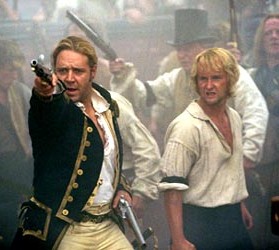 So I caught Peter Weir’s Master and Commander last night and, if you have little trouble discerning the differences among a gaggle of grubby British salts (One looks like Eric Idle, another talks like Captain McAllister, and who knew Pippen was coxswain material?) and don’t go in expecting the action-fiesta promised in the ads, you should come out satisfied. Like pretty much all of Weir’s other films, Commander is an extremely competent piece of work, in some ways even masterful. And, while Crowe’s Captain “Lucky Jack” Aubrey is yet another variation of the strong, silent type he’s done several times elsewhere, he nevertheless commands attention and seems plausible as the glue that holds the creaky H.M.S. Surprise together.
So I caught Peter Weir’s Master and Commander last night and, if you have little trouble discerning the differences among a gaggle of grubby British salts (One looks like Eric Idle, another talks like Captain McAllister, and who knew Pippen was coxswain material?) and don’t go in expecting the action-fiesta promised in the ads, you should come out satisfied. Like pretty much all of Weir’s other films, Commander is an extremely competent piece of work, in some ways even masterful. And, while Crowe’s Captain “Lucky Jack” Aubrey is yet another variation of the strong, silent type he’s done several times elsewhere, he nevertheless commands attention and seems plausible as the glue that holds the creaky H.M.S. Surprise together.
I’d never read any of the Patrick O’Brian novels, so I can’t attest to the movie’s literary veracity. But the historical details seemed right to my landlubber’s eye, and I thought the languid, episodic pacing of the film — which some may find boring, particularly after Jack Sparrow’s romp earlier in the year — helped to convey the rhythm of life at sea in the Napoleonic era, when it took forever and a day to get from place to place. Speaking of which, there’s not all that much suspense about where the film’s going — like the crew of the Surprise, you can see the destination long before Commander gets there. But most of the detours, from the woeful tale of an accursed Jonah to the pre-Darwinian excursions in the Galapagos, are gripping in their own way. In the end, I left Master and Commander feeling like I’d sat through a longer film, but also feeling that I’d traveled somewhere. And while I doubt Commander will spawn many sea epic sequels, nor do I think I’d want to see this film again anytime in the very near future, kudos go out to Peter Weir & crew for making a picture as engrossing and transporting as this one.
